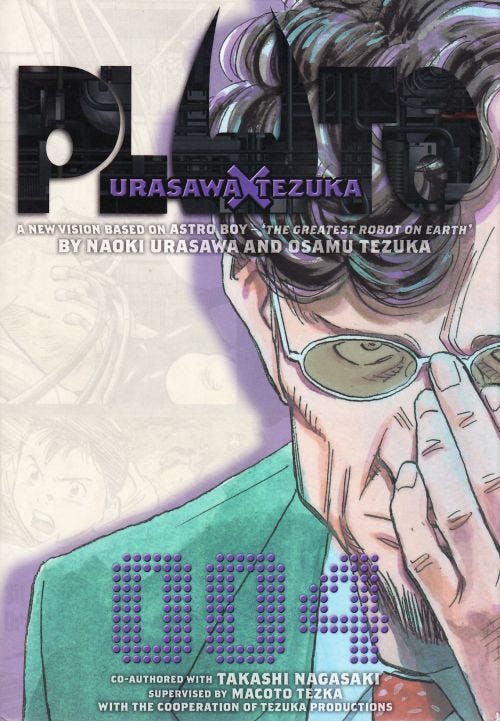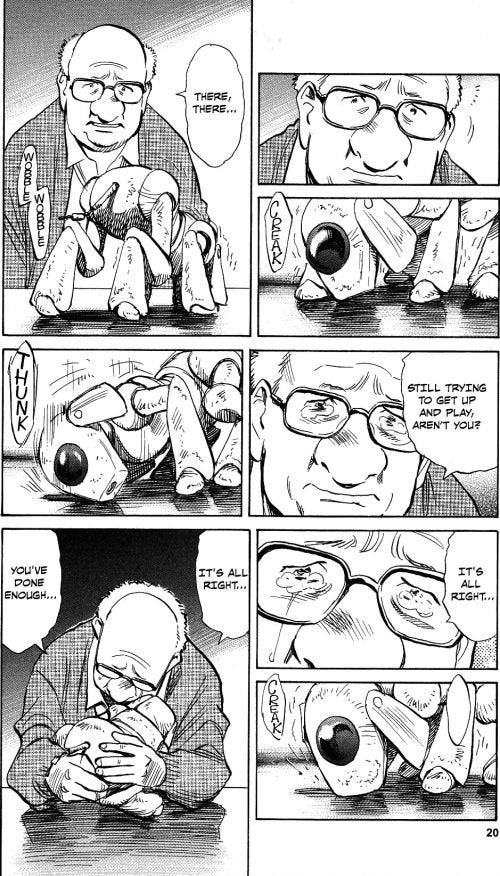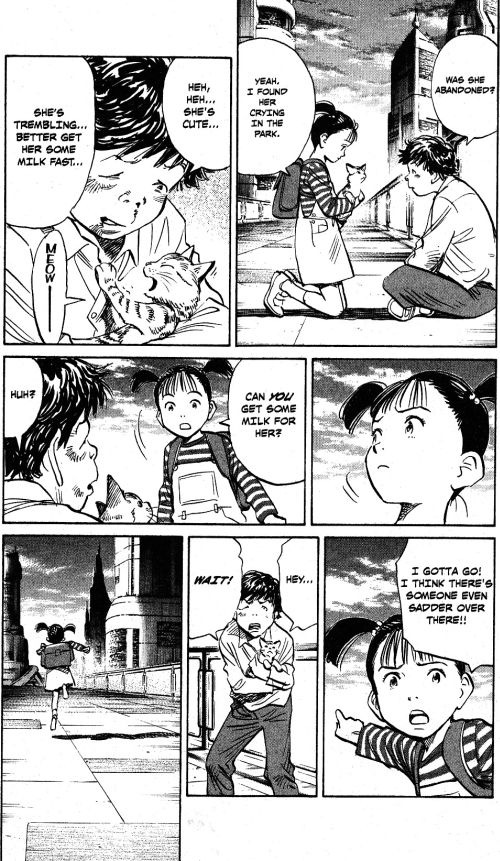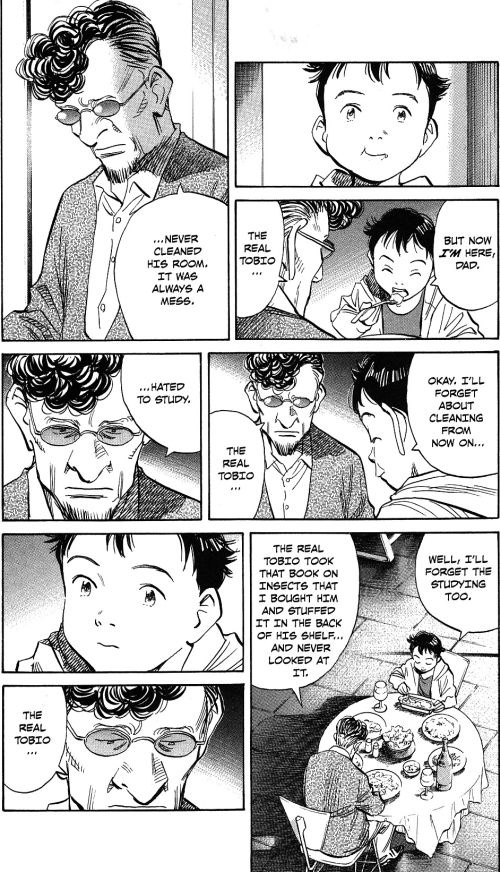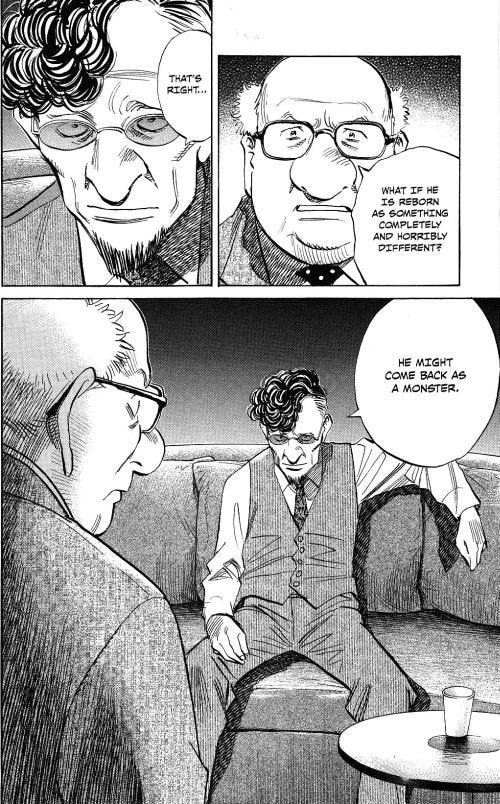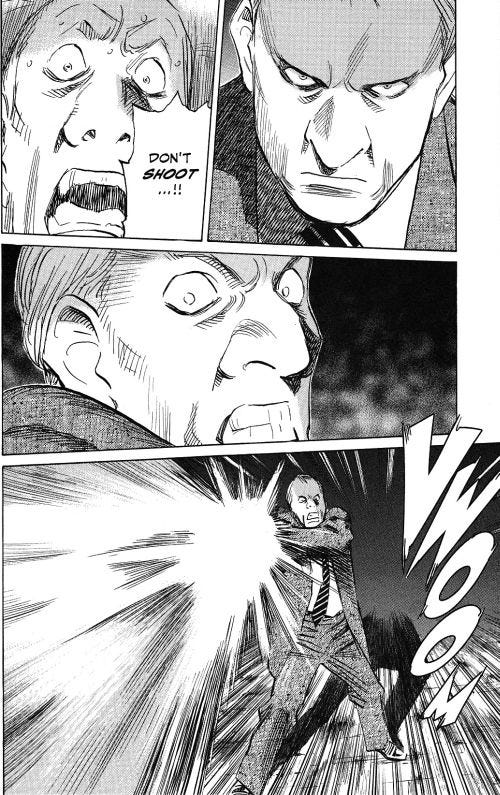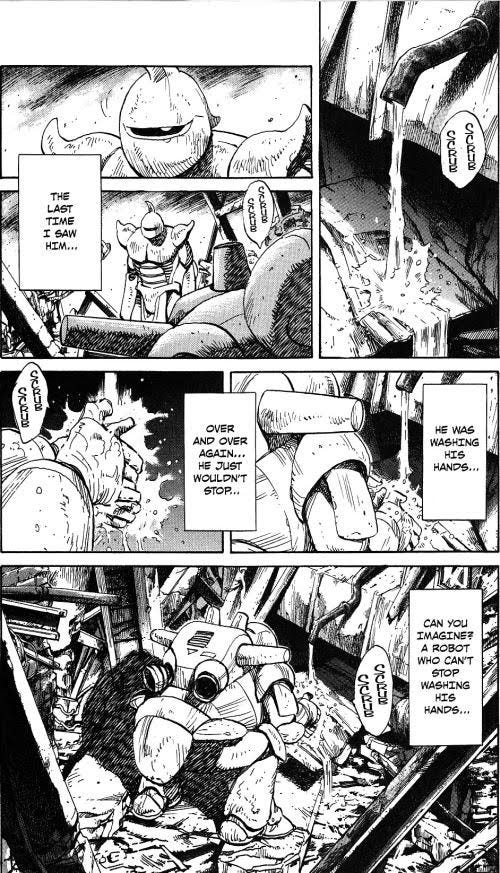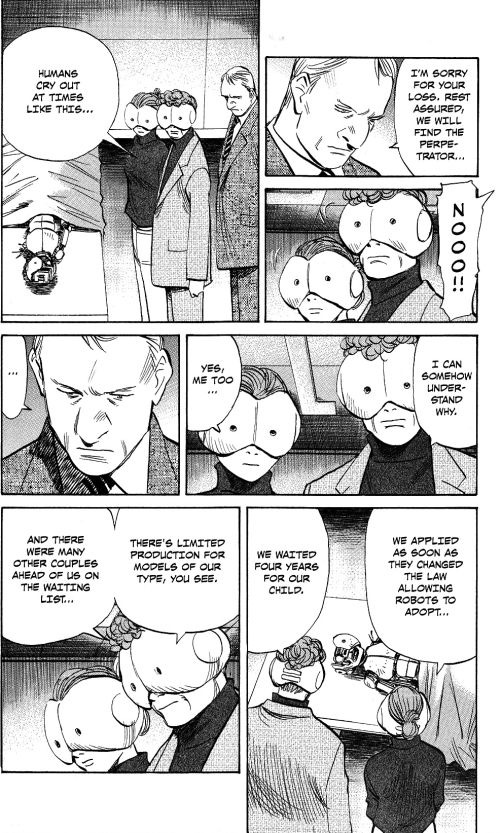Warren Peace Classic: Pluto, Volume 4-5, by Naoki Urasawa
Remembering more volumes of an excellent manga series dealing with robots and emotions.
I wrote about the second volume of the Murderbot Diaries series this week, and as I did after reviewing the previous volume, I wanted to look at a couple reviews I wrote about the manga series Pluto back in 2009:
Pluto, volume 4
By Naoki Urasawa
Published by Viz Media, 2009
Buy it
I worry sometimes that I overpraise Naoki Urasawa, since my reviews of his books are pretty much universally laudatory, falling all over myself to call the man a genius. But I really do think he deserves it, and this volume of his update/re-imagining of Osamu Tezuka's work has some great examples of why, starting with a surprisingly touching scene in the first chapter in which Professor Ochanomizu tries, and ultimately fails, to repair an obsolete robot dog that he found:
That page hits me so hard every time I read it, with the way the dog struggles to its feet and tries to soldier on, seeming like a sad old pet even with its inexpressive mechanical visage, and the tears slowly well up in the Professor's eyes. That takes skill, to wring tears from a reader with a scene about a guy unable to complete some repairs. But it also sets up what's coming wonderfully, as we see how Ochanomizu cares about the beings that he has helped create with his advancements in robot technology, believing that they are capable of so much and wanting to recognize them as living, breathing beings.
And that's where things get especially interesting, as a man shows up claiming to be the owner of the dog but turning out to be much more, a representative of the shadowy, sinister cabal that's behind the recent killings. He wants Ochanomizu to summon Atom to fight (or be destroyed by) Pluto, but the Professor refuses, and the two of them have one of those amazingly tense conversations that Urasawa does so well, debating whether robots can kill, and the way the attempts to make them more and more human conflict with the desire to suppress their lethality:
It's a fascinating idea, and one that seems to be growing into the core of the series, but just watching Urasawa set up the characters and play them off each other is fascinating as well. The emotion that comes through on their faces is perfect, like Ochanomizu's cold anger above. And the facial expressions of his verbal sparring partner are just wild-eyed and inhuman enough to betray his robotic nature. As always, it's gorgeous, gripping work, and that's just in this character interaction, not even taking the amazing high-tech scenery and glimpses of big action that fill the rest of the book.
Yes, Atom does end up fighting Pluto, and he doesn't seem to survive, which is an abrupt, shocking turn, and one that will surely prove to be a false demise, especially considering how it basically happens off-panel. But Urasawa does like to go for the unexpected, and that's what he does here, focusing instead on the reactions of other players, like Gesicht and the other remaining Greatest Robots on Earth. But he doesn't have much time to mourn, since he's busy protecting Adolf Haas, the man who has sworn to kill him. That's a source of juicy drama there, and Urasawa keeps the tension simmering throughout. But he also continues to reveal secrets in drips and drabs, with some revelations about the war that weighs so heavily on everyone's minds seeming especially important, and some discovered footage of the Saddam Hussein-like leader of "Persia" appearing to show him giving a chilling execution order for the group of scientists who have been recently dying. And we also get some hints of the underlying issue, as Atom's creator Dr. Tenma is shown to have been vehemently against further development of artificial intelligence, since to create a perfectly human robot would place powerful, possibly devastating technology in the control of an imperfect being that is slave to its emotions and human failings. And that seems to be exactly what has happened with Pluto himself; only future volumes will tell if the world survives it.
As always, it's exciting, dramatic, gripping work, full of stunning art and engaging storytelling. I wouldn't expect anything less from Urasawa, but somehow, he continues to astonish and amaze me. That's pretty exciting to experience, and considering that the series is only halfway through, there should be plenty more amazement to come.
Pluto, volume 5
By Naoki Urasawa
Published by Viz Media, 2009
Buy it
The great thing about science fiction is that while it can ostensibly be about fantastical concepts and futuristic technology, it's often at its best when examining the nature of humanity itself, whether through symbols or by placing people in an unfamiliar situation that can provoke thought about how they would react. That's exactly what Naoki Urasawa does in this series, following in Osamu Tezuka's lead after he spent a career doing much the same thing. And what's even better, pedants like me can try to tease out brainy interpretations, but people who aren't interested in that sort of thing can ignore it and just enjoy the exciting action and wonderful storytelling, which Urasawa delivers here as well as he ever has.
The plot this volume sees Hercules facing off against Pluto, with what are probably the expected results; Gesicht struggling to deal with his returning memories and the emotions that come with them, while trying to protect Haas from being murdered; and Professor Ochanomizu and Dr. Tenma trying to figure out how to fix Atom after his "death" at the hands of Pluto. And, in a surprisingly touching chapter, Uran runs around Tokyo trying to help people whose sadness she can sense:
That's a nice moment in a chapter full of them, with Urasawa highlight the caring and concern on Uran's face as she begins to wake up to the ideas of compassion and empathy. He's so good with the emotion, and he's able to convey it in such a range of ages and character types. In another nice flashback scene, we see what Dr. Tenma was talking about last volume when he called Atom a failure:
The way Urasawa shows the sadness on his face as he realizes that his dream of recreating his dead son is palpable, yet also understated, and at the same time, we see Atom's realization that he's not meeting his "father's" needs, beginning his own emotional maturity. Beautiful work.
This scene also shows the way Tenma has closed himself off, reserving his emotion and passion for his work. The contrast between the cold way he deals with Atom and the excitement he shows about his ideas for artificial intelligence is surprising:
Urasawa really highlights the body language in this scene, in which Tenma has been working for 18 hours trying to revive Atom. He spends most of it laying on a couch, but the discussion of science makes him sit up straight and become more animated than ever. But when the possible consequences of what he's talking about become clear, revealing that Atom might come out the other side drastically changed, he's back to his reserved self, coldly discussing the possible results:
The way Urasawa takes pains to detail the emotion of his characters really brings the main conflict of the series to the fore. But, aside from the obvious message of humans versus runaway technology, what is the underlying message here? At first, I was thinking about racism and colonialism, since the hate groups and robot civil rights laws seem to point in that direction. And that's not necessarily wrong; the way the robots seem to be slowly growing into their role as full-fledged members of society does seem to correspond with freed slaves figuring out their place in the world, or lower-class countries trying to relate to the rest of the world. But I think it's deeper than that, with Urasawa examining the very nature of emotional maturity itself. Early artificial intelligence makes the robots like children, unable to comprehend adult matters like hatred and vengeance, but now that AI is getting more sophisticated, the robots are waking up to matters that adults have to deal with, whether it's anger, or pain, or sadness, or guilt. And it's fascinating to see this exploration. Tenma's discussion of a robot that has every possible human personality loaded into its circuits is a good metaphor; as with the robot that wouldn't wake up in that state, people need something external to push them in one direction or another. You need a lifetime of experiences and emotions to make a person.
And that's the tragedy of Pluto, or so it seems at this point; he's got too many external stimuli pushing him in conflicting directions, and he can't understand them, causing him to lash out violently, but in a way that certain forces can control. In fact, one could relate this to the anger and repression that certain forces in this world use to spread violence and work toward their evil goals. Maybe that's reading too much into this though; for what it is, Urasawa really brings this conflict to life, demonstrating the terrifying hatred that consumes Gesicht and pushes him into murder:
Or the guilt that consumes a robot during the war, as he's so broken by the destruction of his fellow machines that he can't stop washing the "blood" off his hands, Lady Macbeth-style:
Urasawa even wrings poignance out of a robot couple whose child has been destroyed, as they struggle to comprehend the sadness and anguish that humans feel:
As always, it's masterful work, the kind of thing that you can't put down, needing to know what's going to happen next, but never sure where Urasawa is going to go or what he's going to show you. He'll follow an exciting action scene with an intense confrontation or a fascinating conversation, or even a cute character-based interlude, but never deviating from the main theme, always working to unite everything into a cohesive whole. It's beautiful stuff, every page a demonstration of his talent and skill. There are only three more volumes to go, and it should be amazing to see the finish.




